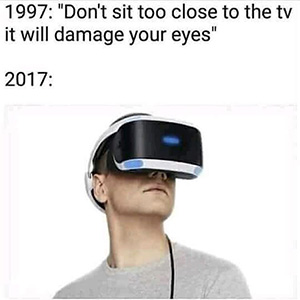
Virtual Reality, Education, Net States, and Behavior Modification
Nov 13, 2017
"...life is not a problem to be solved but a reality to be experienced."
This quote is often attributed to Kierkegaard but was actually written by Sarvepalli Radhakrishnan. The full quotation is: "Spiritual life is not a problem to be solved but a reality to be experienced. It is new birth into enlightenment."
Radhakrishnan was talking about spiritual life in particular but I want to expand it to life in general. It seems like a good starting point for some thoughts about VR and how it fits into education. I work in technology at a school so I get to spend a portion of my time pondering this kind of stuff.
I recently attended a couple of conferences/events that incorporated VR demonstrations. These were my first experiences with the medium and I was impressed. However, I am generally pretty conservative and skeptical when it comes to new technologies and their use in the classroom. My fear with VR (and digital technology in general) is that it increasingly turns life into a problem to be solved, and increasingly isolates people from experiencing unmediated reality.
There is an emerging critique of VR and of the major tech corporations who are pushing it. A recent NY Times story had Jaron Lanier (a pioneer in the field of virtual reality) warning that the technology could make the behavior modification inherent in social media far more powerful:
“If you control the person’s reality, you control the person...Never has a medium been so potent for beauty and so vulnerable to creepiness.”
These companies provide free services that people like. In exchange they give advertisers, foreign governments, and maybe others access to frighteningly effective tools for modifying the behavior of their users (perhaps to buy specific products, believe a particular narrative, hate a certain group of people, etc.). A potent example of how social media can alter people's behavior comes from a recent NYT opinion piece lamenting a change by Facebook that made it much more difficult for independent media outlets in Serbia to reach their audience. Sean Parker (founding president of Facebook) recently gave an interview in which he said he has become a 'conscientious objector' to social media because he worries about the impact it is having on children's brains.
Another recent article, this time in Wired, posits that corporations like Google and Facebook have become 'Net-States'--actors with such global reach and such power that they constitute a force outside of the nation state paradigm.
So, what does this mean for VR and how it ought to be used in education? I think it means that we need to be very careful who we invite into our schools and, by extension, into our kids' heads. Before we use a specific curriculum we need to know who created it and who paid for it to be created. Before we put a VR headset on a 6 or 7 year old we need to know how it is going to affect her highly-plastic brain:
- https://www.theguardian.com/technology/2017/oct/28/virtual-reality-headset-children-cognitive-problems
- https://www.scientificamerican.com/article/are-virtual-reality-headsets-safe-for-children/
- http://time.com/4780507/virtual-reality-vr-problems/
It's well-known that the more people know about digital technology, mobile devices, gadgets, social media, and gaming systems, the more likely they are to severely limit their kids' use of those things. What does it tell us that Steve Jobs didn't let his kids use iPads?
Yes, VR might have some educational usefulness. It's an incredibly engaging medium after all. That is what makes it so powerful. It's potential for good is high. Unfortunately, VR's potential for what Lanier calls 'creepiness' is just as high. Both parents and educators need to be on high alert.